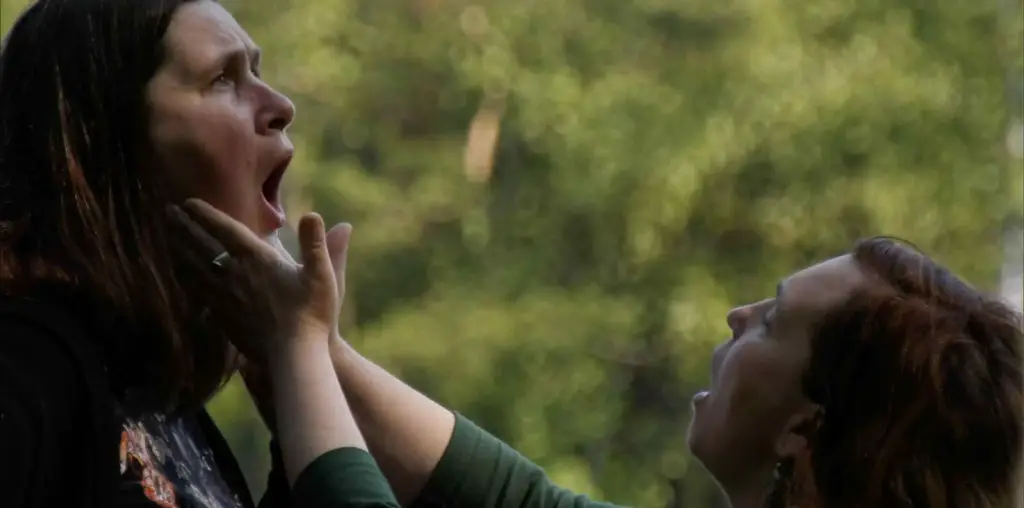
Translating musical theater to film is always a tricky proposition. Recent attempts have met with varying amounts of success (the overrated “Chicago,” the ghastly “Phantom of the Opera”), but Hollywood’s hunger for other properties to devour in order to squeeze out those two hours or so of celluloid entertainment is insatiable. Thus, “Rent:” the latest Broadway play to pass through Tinseltown’s alimentary canal. Based on Jonathan Larson’s award-winning musical about life and love in New York’s East Village, the movie introduces us to seven self-styled “bohemians” (and one fleetingly present sell-out capitalist) who contend with poverty, illness, and struggling to find their artistic vision during one year of their lives, starting on Christmas Eve, 1989.
It’s cold in New York during the winter, especially for struggling filmmaker Mark (Anthony Rapp) and struggling musician Roger (Adam Pascal), who find themselves with no heat, no electricity, and eviction pending for everyone in their building, courtesy of their former comrade Benny (Taye Diggs), who is now their landlord. Benny also wants to tear down the adjacent tent city and put up a “cyber studio” (pretty forward thinking for 1989), but performance artist Maureen (Idina Menzel) is planning a protest. Benny tells Mark and Roger he’ll let them continue living in the building rent-free if they get Maureen to stop her demonstration.
What sounds like the setup to “Breakin’ 2: Electric Boogaloo” is actually the source of some tension in the group. You see, Mark and Maureen used to go out before she dumped him for (female) lawyer Joanne (Tracie Thoms). Mark takes some ribbing for this, but who among us hasn’t dated a woman who later went on to become a lesbian? Also – as I mentioned earlier – nobody has any money. Sure, Collins (Jesse L. Martin) has a teaching gig at NYU, and his boyfriend Angel (Wilson Jermaine Heredia) recently netted $10K for killing the dog of a rich woman’s neighbor, but most of these people are artists, dammit. Why get a day job when you can just make with the rock opera and sing about maybe getting their s**t together and living in the age of AIDS?
Can’t forget the AIDS; four characters have it, after all, (and we’re introduced to most of them in such a rush it caused the person I saw it with to jokingly remark afterwards that she thought the movie might’ve given her the disease). Moreover, in a daring and bohemian twist, they all end up dating each other, although the only people who are allowed any background to explain how they came by the disease are the straight ones, for some reason. Much of the movie (and the play upon which it’s based) involves how these characters live (and die) with the illness, nobly going on with their lives in spite of the death sentence hanging over their heads .
All well and good, but what’s truly baffling here is the self-congratulatory miasma that permeates this film. “Rent” debuted on the stage in 1996, well after movies like “Parting Glances,” “Longtime Companion” or even “Philadelphia” had seriously tackled the subject of AIDS. What may have been shocking – one character’s death, same sex kissing – in the year 1989 probably felt like well-worn territory in ’96, much less in the present day, and serves as an example of how director Chris Columbus’ unquestioning devotion to the source material might not have been the best idea.
Then there’s the exalted “Vie Boheme” that the cast lives and sings about, dropping names like Langston Hughes and Pablo Neruda to prove to all us squares how hip, edgy, and anarchic they are. Instead they end up sounding like just about every sophomore liberal arts major on the planet (although “Neruda” would be a great name for a dog). Then again, the only anarchy these people seem capable of is jumping up and dancing on a lot of tables. It’s like an HIV+ “Fame,” except that the kids from the New York City High School for the Performing Arts got things done, at least. Maureen holds one performance of her protest, which the police break up, then does nothing but annoy Joanne and Mark for the rest of the film. Meanwhile Roger takes an entire year to finish writing one damn song. No wonder these idiots are broke.
It’s hard to fault the performers, however. Rapp, Menzel, Martin, and Thoms are all very good singers, and Rosario Dawson holds her own as Mimi, the stripper who works in the only club in NYC that doesn’t make you take off your top. And while the sets are pretty and the production design is snazzy and all, Columbus can’t help but bludgeon us with schmaltz. This is exemplified in a scene at the end where one of the characters, who’s been living on the New York streets for three weeks during the winter, is miraculously brought back to life – not by medical intervention – but by the healing power of overwrought histrionics.
To paraphrase the play’s most famous song: how do you measure the lien against your soul when you’re forced to sit through something as forcibly maudlin as “Rent?” I dunno, but 525,600 minutes is about how long this movie felt at times.
Disagree with this review? Think you can write a better one? Go right ahead in Film Threat’s BACK TALK section! Click here>>>

